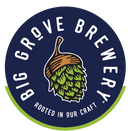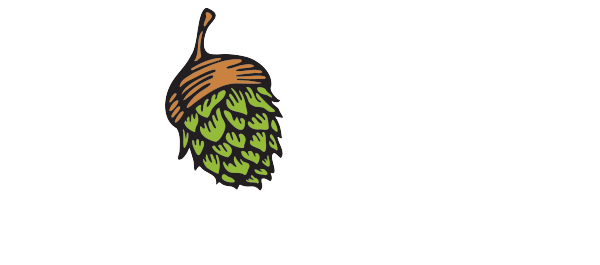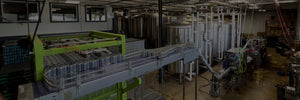Iowa's First CO₂ Reclamation System Installed at Big Grove Brewery
Leading by example in sustainable manufacturing has been a pursuit of ours for many years. We’re thankful to our customers who support us and partners like the city of Iowa City who share in the vision to help lead projects to completion. And across our company, we’re taking steps to benchmark our brewery and business processes to be sustainable long-term.
Next up, our installment of CiCi, a new carbon dioxide (CO₂) reclamation system from Earthly Labs.
Big Grove is a Platinum Green Status Certified Brewery
To maintain our certification as a Platinum-Certified Iowa Green Brewery, we are measured by a matrix of benchmarks by the Iowa Waste Reduction Center (IWRC). Some examples of how we measure and improve our credentials include waste diversion, energy efficiency, and recapturing resources.
• Waste Diversion: Big Grove will divert over 2 million pounds of waste from the landfill this year by recycling, composting and working with a local farm.
• Paper: We moved to a QR Code beer menu system this year in our locations, in place of printing our beer menus daily. This is saving considerable amounts of paper.
• Recycling & Compost: Recycling input has doubled and we’ve halved our solid waste. In 2022, we replaced a green trash dumpster in Iowa City and Des Moines with red compost dumpster. Each month, our Iowa City and Des Moines kitchens compost about 8,000 pounds of waste. That’s the weight of two average passenger cars.
• Spent Grain: Barley is the primary grain used to make beer. The grain is great for structure and contains enzymes that break down starches into sugars we need to make the beer. Our “spent grain” is picked up and reused by a local farmer to feed their cattle, creating a good source of feed protein for cattle. This local partnership saves 150,000 pounds of solid waste each month from the landfill and makes for some very happy cows.
• Energy, Equipment & Water: Use of high efficiency LED lighting and energy efficient equipment have cut down our electricity use. Centrifuging helps maximize the amount of total beer yield, reducing waste of excess raw materials required to make the same delicious pint. Water makes up 95% of an average beer. Without good water quality, we cannot make good beer. That’s why we are always volunteering or brewing beers for causes related to water quality. Recapturing heat from the brewing process is routed back to hot liquor tank storage needed and using less natural gas to reheat. Installing permeable patio pavers help eliminate runoff by capturing rainwater and permeating into the ground. Use of natural lighting in our locations helps save on electricity needed to light the building and see your beautiful faces.
Closed-loop System
Our goal is to create more closed loop systems in our breweries, focusing on reuse of materials and applying toward new parts of the brewing process. Next up, we’re exploring the technology of Nitrogen Generation for draft dispensing. Beginning in October 2022, our Des Moines Brewery & Taproom will install nitrogen generation equipment to begin capture.
How CO₂ adds bubbles in your beer
• When a beer begins fermenting, yeast eats sugars and emits two byproducts, CO₂ and alcohol. Before installing our CiCi unit from Earthly Labs, we didn’t have a way to recapture the CO₂ that was naturally occurring in the fermentation process. Instead, bubble buckets called ‘blow off buckets’ were catching the CO₂ then filtering out into the air. CO₂ is also used in the packaging of our beer, including kegging and canning.
• Prior to the installation of CiCi, CO₂ was purchased from an industrial supplier as a byproduct of petro and ethanol production. The CiCi Unit helps close the loop for fermentation, taking the CO₂ byproduct, recapturing, then using downstream in the packaging of beer.
How the CiCi Unit actually works:
During fermentation, CO₂ is captured from our vessels and moves into 55-gallon drums via hoses. The CO₂ travels 150 - 200’ of hoseline into a pair of foam traps. Foam traps are the last line of defense to prevent liquids from entering into the CiCi unit. The actual CiCi unit is the size of a commercial refrigerator and contains a dehydrator and compressor. CiCi dries the CO₂ gas, scrubs it of impurities with charcoal filtration, and compresses it into a storage flask. Then, CO₂ will be reused later in our packaging and brewing process. Due to the purity of recaptured CO₂, we anticipate some improvements to taste too, like better head retention, better lacing, and a cleaner, more vivid aroma.
Numbers, Cost & Payback Plan
• Future plan is to recover 80-90% of CO₂ needed at our current 20,000bbl production level
• The CiCi unit has reduced our CO₂ use by 120,000lbs or ⅓ less carbon
• 2021: Without Carbon Recapture
• Use: 112,000 pounds of CO₂
• Purchase: 132,000lbs of CO₂
• Emit: 210,000 lbs of CO₂ via fermentation
• TOTAL EMISSIONS = 332,000 lbs of CO₂
• 2022: With Carbon Recapture
• Use: 112,000 pounds of CO₂
• Purchase: 3,480lbs of CO₂
• Emit: 210,000 lbs of CO₂
• TOTAL EMISSIONS = 213,480 lbs of CO₂
• Cost: Through financing agreements and grant funding from the City of Iowa City, it all helped to make it possible to purchase the CiCi unit. The cost of the CiCi unit is estimated to be about $165,000 after delivery and installation.
• Payback: Estimated to take 5-7 years
• The recapture system is complex, requires regular maintenance, and prone to downtime.We can collect CO₂ from a subset of our beers right now, but the ability to do more with less helps us know we’re on the right path.


